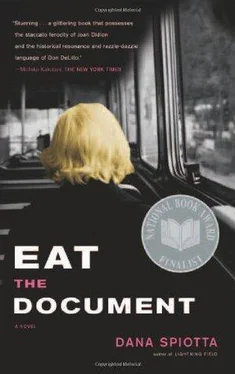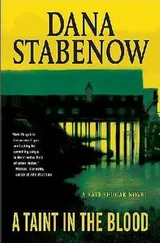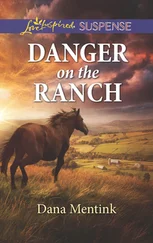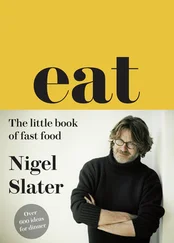Dana Spiotta - Eat the Document
Здесь есть возможность читать онлайн «Dana Spiotta - Eat the Document» весь текст электронной книги совершенно бесплатно (целиком полную версию без сокращений). В некоторых случаях можно слушать аудио, скачать через торрент в формате fb2 и присутствует краткое содержание. Год выпуска: 2006, Издательство: Scribner, Жанр: Современная проза, на английском языке. Описание произведения, (предисловие) а так же отзывы посетителей доступны на портале библиотеки ЛибКат.
- Название:Eat the Document
- Автор:
- Издательство:Scribner
- Жанр:
- Год:2006
- ISBN:нет данных
- Рейтинг книги:3 / 5. Голосов: 1
-
Избранное:Добавить в избранное
- Отзывы:
-
Ваша оценка:
- 60
- 1
- 2
- 3
- 4
- 5
Eat the Document: краткое содержание, описание и аннотация
Предлагаем к чтению аннотацию, описание, краткое содержание или предисловие (зависит от того, что написал сам автор книги «Eat the Document»). Если вы не нашли необходимую информацию о книге — напишите в комментариях, мы постараемся отыскать её.
shifts between the underground movement of the 1970s and the echoes and consequences of that movement in the 1990s. A National Book Award finalist,
is a riveting portrait of two eras and one of the most provocative and compelling novels of recent years.
Eat the Document — читать онлайн бесплатно полную книгу (весь текст) целиком
Ниже представлен текст книги, разбитый по страницам. Система сохранения места последней прочитанной страницы, позволяет с удобством читать онлайн бесплатно книгу «Eat the Document», без необходимости каждый раз заново искать на чём Вы остановились. Поставьте закладку, и сможете в любой момент перейти на страницу, на которой закончили чтение.
Интервал:
Закладка:
Miranda nodded but didn’t move or get up to leave.
“And that crap cinema pseudo meta-provo group has got to go,” he said, mostly to himself and his clipboard.
“I thought they were ecto-provo.”
“That has no meaning, you realize that, don’t you? Still, that’s probably the best thing about them,” Nash said.
“You don’t like Josh, do you?” she said.
“He is a very bright guy. A little overenamored of his finely calibrated sensibility perhaps, and maybe also contrary for its own sake, and definitely more cynical than he could possibly have the right to be. But, all in all a sharp kid.”
“You don’t like him.”
Nash smiled at her as he marked something on his clipboard.
“We are moving to New York for a project Josh is working on. Top secret. I think it will be cool.”
She started to say more, but as Nash began silently mouthing his count, she stopped herself.
“No, I don’t like Josh,” he said, but she probably didn’t hear, because she was already out the door. After he realized Miranda was gone, Nash sat for a minute. He leaned back and lay on the bench by the bookshelves. He closed his eyes and listened to the music.
PART SEVEN. 1982–1999
Rules of Engagement
IT WASN’T THAT she no longer loved Augie. She felt increasing affection for him. It wasn’t that she found him repellent in any way. Objectively she would watch him from across the room when he went to get another beer from the bar. He was pleasing in a gentle-bear way. Nice muscles covered by an easygoing layer of soft fat. No edges, no offenses. But somehow the initial excitement of sleeping with him left with no warning. It didn’t wane or dwindle. It just disappeared for her altogether.
She liked him, his hair, his large eyes, his bumped-up hands, his open face. She thought he smelled just fine — not at all bad. Sometimes she noticed his breath, but not too often. That was not it. There was nothing specific in his person that offended her or put her off. Everything was fine, even pleasing. So why then did she suddenly have no desire for him? He still desired her. He wanted lots of sex, and she complied as much as she could. But sometimes he took so long, and her generosity would fray. She would catch herself thinking, Come on. And he would nearly come but not quite. He’d want to switch positions. And the thing of it was Louise knew she could never betray her impatience. She couldn’t say “hurry up” because that didn’t help at all. No, the best thing was to feign enthusiasm, to act as turned on and enthusiastic as possible to peak his desire and make him come. But it was a fine line: if she feigned too much enthusiasm, he might try to hold back longer, to prolong her enjoyment. Often she flicked her tongue at his ear suddenly, or whispered a hushed cliché to him at a crucial moment. She knew to stroke his back but not in too distracting a way. It wasn’t that she minded his being inside her, but the artifice and the effort required, that was tough. He relaxed after and looked at her in adoration. He didn’t know, did he? She was ashamed and terrified to think that he might know. But maybe he didn’t. She had become so good at arousing him, at the micro-modulations that worked his desire. She had paid attention, it was true, but just not for the reasons he believed.
Would it be better to be honest? He used to try, quite often, to get her to come. He was not bad at it. He would slip down beneath the sheets and stay there until it was done. He seemed to enjoy himself — perhaps feigning for the same reasons she did, perhaps not. She didn’t fake orgasms. No reason to. When he used his mouth she could have them quite easily. Sometimes so intense and shaky that she couldn’t believe they came from within her. But it still didn’t matter. She also did this for him. She didn’t really care if she had the orgasm. She would just as soon have gone to sleep. Because in a way an orgasm is mostly a physical thing, which doesn’t necessarily have to do with desire. Desire was more complex: a desperation and a need you felt before, an imagining and then a realizing during. It required mind and body. Her body was just fine. Her imagination — well, it failed her most of the time.
She wondered if she felt this way because she still longed for Bobby. Because she still, after all these years, remembered his smell, his taste, his touch. Mostly she remembered wanting him deeply. She could also still remember when she had wanted Augie badly. But her desire for Bobby continued, that was the difference. And there was the question: Did she still want Bobby because things didn’t have time to dwindle and disappear the way they did with Augie? Or was it just different, did she just love Bobby more? If she’d met Augie first, would she pine for him? It occurred to her that her shutdown, her unfeeling state, could not last indefinitely. He would catch on, or she would grow too impatient, and it would be over.
Sometimes when she lay on her bed, she considered that there was no longer any point in not giving herself up. She knew she could dwindle only so long and then she would turn herself in after she had made the freedom part of her life as lifeless as any incarceration could possibly be. “There’s no escape.” Yes, but not for the reasons you might think.
When August reached for her, she would order herself to think of her early times with him. The rainy afternoon she visited him at his job site, a large country house. He took her hand and led her into the woods behind the building. Despite the rain, they leaned against a tree, kissing and pulling at clothes. He yanked and adjusted her and then she was on him, both of them clothed and aching for it. She could remember all these moments in her head; she could not remember them in her body. She could not get them to live in her skin, between her legs and then to a shivery platform of interior nerves, forcing the tiniest of anticipatory contractions, the floor of her muscles already quivering. She could not conjure that.
She knew she should change her life. She felt herself to be in such a diminished, subtracted state. It even occurred to her that it might be the name itself — Louise Barrot. She believed taking the name of a dead infant had colored all her possibilities, tinted everything with morbidity. She knew also that the dead infant took on more significance for other reasons. Her underground status had convoluted all context — the fact that she could change her identity so completely changed the very possibility of engagement, or precluded the possibility of real engagement. She regarded everything and everyone from a distance, both ephemeral and abstract.
After a few months of dustiness that progressed into a low-grade disgust for her life with Augie, he began to speak to her about their future with great specificity. Amazingly, Augie had developed a real attachment to her. But it just made her feel trapped, circumscribed, desperate. People with real freedom never do really “free” things, like reinvent themselves, leave lives behind, change everything. Only trapped, desperate people did that. It took such coldness and will. She thought of it constantly. Rephrased it to see if she could find some comfort in it. Not go to jail . But surrender. Resurface . That sounded good, as though she had been drowning underground. She could yield, retire, repent .
She could see her family again. But she would have to go to trial. She would have to convince them she was innocent, which she wasn’t. Repentant? Perhaps. Regretful? Definitely. Or she could make a speech, say she wasn’t sorry, say she’d do it again if she had her life to live over. And then she would certainly go to jail for a long time. Especially if she didn’t give any information about the others, which of course she could never, ever do.
Читать дальшеИнтервал:
Закладка:
Похожие книги на «Eat the Document»
Представляем Вашему вниманию похожие книги на «Eat the Document» списком для выбора. Мы отобрали схожую по названию и смыслу литературу в надежде предоставить читателям больше вариантов отыскать новые, интересные, ещё непрочитанные произведения.
Обсуждение, отзывы о книге «Eat the Document» и просто собственные мнения читателей. Оставьте ваши комментарии, напишите, что Вы думаете о произведении, его смысле или главных героях. Укажите что конкретно понравилось, а что нет, и почему Вы так считаете.












